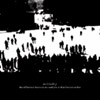 The energy of MClusky cannot be denied on their second full-length asthey blister their way trough another group of songs that will astoundand confound even the staunchest fan. It's been a while since"Lightsabre Cocksucking Blues" and the dancing Flash kittens, andMclusky want the world to know that even though founding member MatHarding parted ways with the band, the essence is still here and thepurpose is still to destroy. There's a conscious effort, it seems, tomake the songs a bit longer on this release, where previous releaseswere chock-full of two minute masterpieces; and the material hascertainly veered more to the Dark Side of the Force for the moment.Neither makes a negative impact on the music, however, and Steve Albiniagain manages to stay out of the way of this band and just capturetheir live essence without need for much studio trickery. That is stillthe best way to experience Mclusky, it seems, as their shows tend to beplain incendiary in nature, and with an arsenal like this, there's notelling how many would survive the barrage. The cackles and roostercalls on the opening track meld well with the distorted guitars andhard-hitting drums. Andy Falkous is just as cockney and clever, andeven though he's claiming "everwhere I look is a darkness," he soundslike he hasn't had this much fun in years. He screams his lungs out,double-tracking everywhere and writing half-cliché and half brilliancein his lyrics ("Note to invading aliens: avoid this town like this townavoided us" is a personal favorite). Mclusky have a great gift formelody, where even the trashiest or thrashiest songs are catchy as allhell, and I couldn't help nodding my head as accompaniment. Overall,they're just as sloppy, just as unpolished, and just as purely comicalas always. Quite frankly, I'm glad they wouldn't have it any other way,as Mclusky are a breath of fresh air.
The energy of MClusky cannot be denied on their second full-length asthey blister their way trough another group of songs that will astoundand confound even the staunchest fan. It's been a while since"Lightsabre Cocksucking Blues" and the dancing Flash kittens, andMclusky want the world to know that even though founding member MatHarding parted ways with the band, the essence is still here and thepurpose is still to destroy. There's a conscious effort, it seems, tomake the songs a bit longer on this release, where previous releaseswere chock-full of two minute masterpieces; and the material hascertainly veered more to the Dark Side of the Force for the moment.Neither makes a negative impact on the music, however, and Steve Albiniagain manages to stay out of the way of this band and just capturetheir live essence without need for much studio trickery. That is stillthe best way to experience Mclusky, it seems, as their shows tend to beplain incendiary in nature, and with an arsenal like this, there's notelling how many would survive the barrage. The cackles and roostercalls on the opening track meld well with the distorted guitars andhard-hitting drums. Andy Falkous is just as cockney and clever, andeven though he's claiming "everwhere I look is a darkness," he soundslike he hasn't had this much fun in years. He screams his lungs out,double-tracking everywhere and writing half-cliché and half brilliancein his lyrics ("Note to invading aliens: avoid this town like this townavoided us" is a personal favorite). Mclusky have a great gift formelody, where even the trashiest or thrashiest songs are catchy as allhell, and I couldn't help nodding my head as accompaniment. Overall,they're just as sloppy, just as unpolished, and just as purely comicalas always. Quite frankly, I'm glad they wouldn't have it any other way,as Mclusky are a breath of fresh air.  The energy of MClusky cannot be denied on their second full-length asthey blister their way trough another group of songs that will astoundand confound even the staunchest fan. It's been a while since"Lightsabre Cocksucking Blues" and the dancing Flash kittens, andMclusky want the world to know that even though founding member MatHarding parted ways with the band, the essence is still here and thepurpose is still to destroy. There's a conscious effort, it seems, tomake the songs a bit longer on this release, where previous releaseswere chock-full of two minute masterpieces; and the material hascertainly veered more to the Dark Side of the Force for the moment.Neither makes a negative impact on the music, however, and Steve Albiniagain manages to stay out of the way of this band and just capturetheir live essence without need for much studio trickery. That is stillthe best way to experience Mclusky, it seems, as their shows tend to beplain incendiary in nature, and with an arsenal like this, there's notelling how many would survive the barrage. The cackles and roostercalls on the opening track meld well with the distorted guitars andhard-hitting drums. Andy Falkous is just as cockney and clever, andeven though he's claiming "everwhere I look is a darkness," he soundslike he hasn't had this much fun in years. He screams his lungs out,double-tracking everywhere and writing half-cliché and half brilliancein his lyrics ("Note to invading aliens: avoid this town like this townavoided us" is a personal favorite). Mclusky have a great gift formelody, where even the trashiest or thrashiest songs are catchy as allhell, and I couldn't help nodding my head as accompaniment. Overall,they're just as sloppy, just as unpolished, and just as purely comicalas always. Quite frankly, I'm glad they wouldn't have it any other way,as Mclusky are a breath of fresh air.
The energy of MClusky cannot be denied on their second full-length asthey blister their way trough another group of songs that will astoundand confound even the staunchest fan. It's been a while since"Lightsabre Cocksucking Blues" and the dancing Flash kittens, andMclusky want the world to know that even though founding member MatHarding parted ways with the band, the essence is still here and thepurpose is still to destroy. There's a conscious effort, it seems, tomake the songs a bit longer on this release, where previous releaseswere chock-full of two minute masterpieces; and the material hascertainly veered more to the Dark Side of the Force for the moment.Neither makes a negative impact on the music, however, and Steve Albiniagain manages to stay out of the way of this band and just capturetheir live essence without need for much studio trickery. That is stillthe best way to experience Mclusky, it seems, as their shows tend to beplain incendiary in nature, and with an arsenal like this, there's notelling how many would survive the barrage. The cackles and roostercalls on the opening track meld well with the distorted guitars andhard-hitting drums. Andy Falkous is just as cockney and clever, andeven though he's claiming "everwhere I look is a darkness," he soundslike he hasn't had this much fun in years. He screams his lungs out,double-tracking everywhere and writing half-cliché and half brilliancein his lyrics ("Note to invading aliens: avoid this town like this townavoided us" is a personal favorite). Mclusky have a great gift formelody, where even the trashiest or thrashiest songs are catchy as allhell, and I couldn't help nodding my head as accompaniment. Overall,they're just as sloppy, just as unpolished, and just as purely comicalas always. Quite frankly, I'm glad they wouldn't have it any other way,as Mclusky are a breath of fresh air. 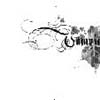 The one phrase Cliff's Notes line on Shadow Huntaz is simply: "Skamdoes hip-hop." While that's true on the surface, it might be a bitmisleading as the Shadow Huntaz' full-length on Skam is considerablymore straight-forward than I would have expected. Funckarma provide theproduction that is all funky electro hip-hop, heavy on the synths andsynthetic drums with a little bit of the signature Skam skitter, butnot as much tweaked beat-splicing as the idea of the project mightlead-on. The Vampire EPis more of the same, solid work from Shadow Huntaz, who combine cleverrhymes and interesting if not mindblowing beats in a way that is theirown. The title track, "Vampire" is a funky start/stop groove withstaccato rhymes bumping over acidy basslines. The analogy of rappers asvampires is only hinted at here, but it works. The remix of "Night,"from the Corrupt Data full length is an odd reworking thattakes some of the bombast out of the original, replacing it with echoesand a spooky, hollow ambience and tb303 bass that make it a completelydifferent track with old vocals. "Fasho" is the only misfire here--atrack that sounds like a b-side and sits uncomfortablly with itsuptempo, nearly drum n' bass tempo admist tracks of slow hip-hopnodding. "Don't got" rounds out the ep with a laundry list of thethings that the Shadow Huntaz "don't got" and it broadens the pallettea bit with chopped up samples of jazzy piano poking out in betweenbeats. While Corrupt Data includes more and often better tracks than this EP, Vampireadds to the breadth of the Shadow Huntaz formula that was starting tosound like a one-trick game by the end of the full length. This isliterate but not overly-intellectualized hip-hop that grooves andsurprises along the way.
The one phrase Cliff's Notes line on Shadow Huntaz is simply: "Skamdoes hip-hop." While that's true on the surface, it might be a bitmisleading as the Shadow Huntaz' full-length on Skam is considerablymore straight-forward than I would have expected. Funckarma provide theproduction that is all funky electro hip-hop, heavy on the synths andsynthetic drums with a little bit of the signature Skam skitter, butnot as much tweaked beat-splicing as the idea of the project mightlead-on. The Vampire EPis more of the same, solid work from Shadow Huntaz, who combine cleverrhymes and interesting if not mindblowing beats in a way that is theirown. The title track, "Vampire" is a funky start/stop groove withstaccato rhymes bumping over acidy basslines. The analogy of rappers asvampires is only hinted at here, but it works. The remix of "Night,"from the Corrupt Data full length is an odd reworking thattakes some of the bombast out of the original, replacing it with echoesand a spooky, hollow ambience and tb303 bass that make it a completelydifferent track with old vocals. "Fasho" is the only misfire here--atrack that sounds like a b-side and sits uncomfortablly with itsuptempo, nearly drum n' bass tempo admist tracks of slow hip-hopnodding. "Don't got" rounds out the ep with a laundry list of thethings that the Shadow Huntaz "don't got" and it broadens the pallettea bit with chopped up samples of jazzy piano poking out in betweenbeats. While Corrupt Data includes more and often better tracks than this EP, Vampireadds to the breadth of the Shadow Huntaz formula that was starting tosound like a one-trick game by the end of the full length. This isliterate but not overly-intellectualized hip-hop that grooves andsurprises along the way.  A garage band with all the usual obvious influences, Catheters manageto develop a sound more concerned with crafting interesting, imperativesongs than aping the components of their idols. They've melted it alldown and assembled it in their own way. For every heavy riff andscreeching vocal there is a bright melody, slicing its way through themurk and giving the songs a deeper character and personality. "NoNatural Law" sets it off at high speed, and rarely does the band slowdown over the course of the album. "Reaction" swaggers along with atambourine shake and the vocal acrobatics of singer Brian Standeford.While he is rarely not bellowing or barking out the lyrics, he uses thefull value of his vocal cords by imbuing every word or phrase with adistinct feeling and cadence. This contribution is yet another layer ofingenuity, raising HowlingÉ It Grows and Grows!!!a cut above the rest. Every opportunity to fall back into typical,everyday rock maneuvers is subverted by an attention to detail andcraft that brays out of the speakers with full force. "Brave Drum" isan archetypal rock song, not because it sounds typical but because moresongs should sound like it. It is a great blueprint, every instrumentknowing its role and at peak performance. The arrangement shakes andshimmies, at once bursting at the seams with reckless abandon but alsodeftly thought out with an ear for balance. While the album lacks anyreal shifts in dynamics or tone, it is loaded full of great, full onrock songs. The band clearly knows what works for them, and may feel alittle reserved about taking a stab at something different. Theintricacies of these songs, however, demonstrate that Catheters mightjust be capable of any number of progressions in their future, and mayfind themselves there soon enough if they keep up with the song craftheard on HowlingÉ -
A garage band with all the usual obvious influences, Catheters manageto develop a sound more concerned with crafting interesting, imperativesongs than aping the components of their idols. They've melted it alldown and assembled it in their own way. For every heavy riff andscreeching vocal there is a bright melody, slicing its way through themurk and giving the songs a deeper character and personality. "NoNatural Law" sets it off at high speed, and rarely does the band slowdown over the course of the album. "Reaction" swaggers along with atambourine shake and the vocal acrobatics of singer Brian Standeford.While he is rarely not bellowing or barking out the lyrics, he uses thefull value of his vocal cords by imbuing every word or phrase with adistinct feeling and cadence. This contribution is yet another layer ofingenuity, raising HowlingÉ It Grows and Grows!!!a cut above the rest. Every opportunity to fall back into typical,everyday rock maneuvers is subverted by an attention to detail andcraft that brays out of the speakers with full force. "Brave Drum" isan archetypal rock song, not because it sounds typical but because moresongs should sound like it. It is a great blueprint, every instrumentknowing its role and at peak performance. The arrangement shakes andshimmies, at once bursting at the seams with reckless abandon but alsodeftly thought out with an ear for balance. While the album lacks anyreal shifts in dynamics or tone, it is loaded full of great, full onrock songs. The band clearly knows what works for them, and may feel alittle reserved about taking a stab at something different. Theintricacies of these songs, however, demonstrate that Catheters mightjust be capable of any number of progressions in their future, and mayfind themselves there soon enough if they keep up with the song craftheard on HowlingÉ -  Whether or not Hypo's new album of "music that talks about music" issomething worth listening to depends entirely on your relationship toHypo's very particular ideas about what makes music good and bad. Byhis own admission, the album is a reflection on what he loves and whathe hates about music. It's about disposable pop music and overly-adoredintellectual music, and it works as Hypo's extended middle fingerresponse to supposed "indie" music selling a retreaded version ofthings we have already experienced to a new audience under falsepretenses of novelty. All of that is fine as a treatise against thefashion of popular music, but the album is executed more like arambling blog than a well-documented thesis. It's nearly impossibly toenjoy tracks like "Serpentinouze", even if they are supposed to be apisstake at crappy electroclash and fashion-centric indie pop music.This kind of self-referential musical criticism of other music is atricky thing to pull off. V/VM and Kid606 do it well on occasion, as dothe mashup djs who turn pop songs on their heads. Unfortunately, Hypofails to give us soemthing unique and interesting and new in the wakeof all the whining. If pop music as it is represented here is so bad,and if the people forwarding an agenda of banal and superficial musicare the evil villains of this story, then I'm still waiting for Hypo toproduce the hero. Random Venezianodoes a fair job of chopping up and spitting out pop music cliché byperforming a digital snip and splice job on a lot of annoying sounds,but it all remains annoying in the end. Perhaps Hypo hasactually accomplished his goal too well in that he has created such anappalling mirror image of cheesy music that it is itself equallydisposable and skippable.
Whether or not Hypo's new album of "music that talks about music" issomething worth listening to depends entirely on your relationship toHypo's very particular ideas about what makes music good and bad. Byhis own admission, the album is a reflection on what he loves and whathe hates about music. It's about disposable pop music and overly-adoredintellectual music, and it works as Hypo's extended middle fingerresponse to supposed "indie" music selling a retreaded version ofthings we have already experienced to a new audience under falsepretenses of novelty. All of that is fine as a treatise against thefashion of popular music, but the album is executed more like arambling blog than a well-documented thesis. It's nearly impossibly toenjoy tracks like "Serpentinouze", even if they are supposed to be apisstake at crappy electroclash and fashion-centric indie pop music.This kind of self-referential musical criticism of other music is atricky thing to pull off. V/VM and Kid606 do it well on occasion, as dothe mashup djs who turn pop songs on their heads. Unfortunately, Hypofails to give us soemthing unique and interesting and new in the wakeof all the whining. If pop music as it is represented here is so bad,and if the people forwarding an agenda of banal and superficial musicare the evil villains of this story, then I'm still waiting for Hypo toproduce the hero. Random Venezianodoes a fair job of chopping up and spitting out pop music cliché byperforming a digital snip and splice job on a lot of annoying sounds,but it all remains annoying in the end. Perhaps Hypo hasactually accomplished his goal too well in that he has created such anappalling mirror image of cheesy music that it is itself equallydisposable and skippable. The albums title serves as a perplexing contradiction, as there is verylittle that is truly real about Pink Grease, from certain syntheticelements of their concept to their synthesizers. No doubt it is tonguein cheek, as the amount of mugging and jiving the band does on thealbum indicates it has a strong sense of irony (though maybe not asstrong with humor and discernment). "Remember Forever" opens the discwith singer Rory Lewarne doing his best to channel Lux Interior,flinging trashy rockabilly phrasing against somewhat morestraightforward guitar riffing. By the point the song enters into itsboy-girl call and response breakdown, the Pink Grease have made a goodargument that they while their influences aren't exactly a secret,there might be something to this whole thing. "Fever" unfortunatelytrades in any number of rock/dance clichés, from the oscillating twonote riff we've all heard a thousand times before to lyrical turns ofphrase about being on a mission, how a girl drives him crazy, and howthat is quite like having a fever. "The Pink G.R. EASE" puts the bandin the league of bands like Big Country who perform a song named afterthe band, though with slightly more pleasant results. It's a modestdance anthem (Dancethem? Perhaps I have coined the next absurd musicalphrase!) that serves its role quite well. "Party Live," whilerelentlessly catchy, also brings up the questionable intents of whitepeople using the word "nigger" to give their songs some kind of edge. Iam sure there are innumerable graduate theses to be referred to on thissubject, but my own personal take is that it is the clearest indicationof posing and posturing there ever could be. In this case it isunfortunate, not just for the ambiguous societal implications, but alsobecause "Party Live" is a pretty fun song, marred by an attempt to sexit up-looking for a shortcut to evocative sleaze and seedy fun withoutwanting to work for it. In spite of these issues, Pink Grease managesto do their best when forgetting about their Cramps aspirations andquasi-ironic image and puts together some really great songs that arejust this side of power-pop. "Wind Up Bird" sails along on a solidmelody replete with vocal tradeoffs and jangly guitar lines that makeit a strong contender for song of the year. "Peaches," the followingtrack is in a similar vein, looking toward a more honest sound andfeeling than any of the glam-trash affectations of yesteryear. Whilethe band does score some good hits with their purported shtick andpremise, these songs are the strongest on the whole disc, anddemonstrate that Pink Grease is capable of something more than they leton. Pink Grease is undeniably catchy, and at their best will force assshaking (nobody could listen to "Superfool" and not find themselvesimmersed in it), but at their worst they sound like a slightly lessobvious Electric Six with lyrics like "I wanna fucking die for you / Iwanna die fucking you." There is room for growth here, and hopefully inthe future, Pink Grease will eschew the gimmick and explode with thepotential that they surely have.
The albums title serves as a perplexing contradiction, as there is verylittle that is truly real about Pink Grease, from certain syntheticelements of their concept to their synthesizers. No doubt it is tonguein cheek, as the amount of mugging and jiving the band does on thealbum indicates it has a strong sense of irony (though maybe not asstrong with humor and discernment). "Remember Forever" opens the discwith singer Rory Lewarne doing his best to channel Lux Interior,flinging trashy rockabilly phrasing against somewhat morestraightforward guitar riffing. By the point the song enters into itsboy-girl call and response breakdown, the Pink Grease have made a goodargument that they while their influences aren't exactly a secret,there might be something to this whole thing. "Fever" unfortunatelytrades in any number of rock/dance clichés, from the oscillating twonote riff we've all heard a thousand times before to lyrical turns ofphrase about being on a mission, how a girl drives him crazy, and howthat is quite like having a fever. "The Pink G.R. EASE" puts the bandin the league of bands like Big Country who perform a song named afterthe band, though with slightly more pleasant results. It's a modestdance anthem (Dancethem? Perhaps I have coined the next absurd musicalphrase!) that serves its role quite well. "Party Live," whilerelentlessly catchy, also brings up the questionable intents of whitepeople using the word "nigger" to give their songs some kind of edge. Iam sure there are innumerable graduate theses to be referred to on thissubject, but my own personal take is that it is the clearest indicationof posing and posturing there ever could be. In this case it isunfortunate, not just for the ambiguous societal implications, but alsobecause "Party Live" is a pretty fun song, marred by an attempt to sexit up-looking for a shortcut to evocative sleaze and seedy fun withoutwanting to work for it. In spite of these issues, Pink Grease managesto do their best when forgetting about their Cramps aspirations andquasi-ironic image and puts together some really great songs that arejust this side of power-pop. "Wind Up Bird" sails along on a solidmelody replete with vocal tradeoffs and jangly guitar lines that makeit a strong contender for song of the year. "Peaches," the followingtrack is in a similar vein, looking toward a more honest sound andfeeling than any of the glam-trash affectations of yesteryear. Whilethe band does score some good hits with their purported shtick andpremise, these songs are the strongest on the whole disc, anddemonstrate that Pink Grease is capable of something more than they leton. Pink Grease is undeniably catchy, and at their best will force assshaking (nobody could listen to "Superfool" and not find themselvesimmersed in it), but at their worst they sound like a slightly lessobvious Electric Six with lyrics like "I wanna fucking die for you / Iwanna die fucking you." There is room for growth here, and hopefully inthe future, Pink Grease will eschew the gimmick and explode with thepotential that they surely have.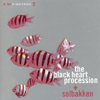 In the latest installment in this series from Konkurrent, these twobands who have shared the stage at various shows since 1998 attempt tocapture a common magic, and there are no outstanding blemishes as faras I can hear. Very often collaborations between bands have thepotential to backfire in the worst way, where the bands have absolutelyno way of working with each other to produce anything that is at allworthwhile listening. These two are a perfect fit, seemingly bringingout the best in each other, and challenging each other in areas theother is not used to working. In this setting, they feed off of eachother, making huge strides and approaching a transcendental music thatis neither group as well as both of them. Most of the tracks feature afluid piano line and the very capable vocals of Pall, who even thoughmay have been short on lyrical ideas, or so it seems, still carrieshimself with a staid confidence in his voice and words. Violins accentthe proceedings here and there, instantly adding a spooky or sadquality to any song they touch, and the female vocals on the firsttrack are a welcome addition, even though the voice is not to be heardanywhere else on the CD. "Dog Song" is a bit silly, and thankfully isthe shortest track, but even it has its moments of complete endearment.The centerpiece and most amazing track, though, representative of whatthese two groups can accomplish together, is the nigh-eleven-minute"Things Go on With Mistakes." It's a steady rhythm guitar and theviolin, then western-style guitar bends, then the voice of Pall enterswith the drums, then the piano joins in, in a fluid progression andaddition from one element to the next. That's pretty much it, not verymuch variation in the melody, but small nuances and a build-up thendissolution of energy make it absolutely captivating. It is the onetrack I will be putting on my iPod, and the one track I listened toagain and again. Where the other songs certainly have aspects worthlistening to, especially the closing song "Your Cave," "Mistakes" isreason alone to listen to this release. It utterly destroyed me.
In the latest installment in this series from Konkurrent, these twobands who have shared the stage at various shows since 1998 attempt tocapture a common magic, and there are no outstanding blemishes as faras I can hear. Very often collaborations between bands have thepotential to backfire in the worst way, where the bands have absolutelyno way of working with each other to produce anything that is at allworthwhile listening. These two are a perfect fit, seemingly bringingout the best in each other, and challenging each other in areas theother is not used to working. In this setting, they feed off of eachother, making huge strides and approaching a transcendental music thatis neither group as well as both of them. Most of the tracks feature afluid piano line and the very capable vocals of Pall, who even thoughmay have been short on lyrical ideas, or so it seems, still carrieshimself with a staid confidence in his voice and words. Violins accentthe proceedings here and there, instantly adding a spooky or sadquality to any song they touch, and the female vocals on the firsttrack are a welcome addition, even though the voice is not to be heardanywhere else on the CD. "Dog Song" is a bit silly, and thankfully isthe shortest track, but even it has its moments of complete endearment.The centerpiece and most amazing track, though, representative of whatthese two groups can accomplish together, is the nigh-eleven-minute"Things Go on With Mistakes." It's a steady rhythm guitar and theviolin, then western-style guitar bends, then the voice of Pall enterswith the drums, then the piano joins in, in a fluid progression andaddition from one element to the next. That's pretty much it, not verymuch variation in the melody, but small nuances and a build-up thendissolution of energy make it absolutely captivating. It is the onetrack I will be putting on my iPod, and the one track I listened toagain and again. Where the other songs certainly have aspects worthlistening to, especially the closing song "Your Cave," "Mistakes" isreason alone to listen to this release. It utterly destroyed me.  The cover proclaims "this is not Italian prog rock" and I guess I canunderstand why they might want to put a warning on here: there'snothing progressive or impressive about this record at all. I've neverbeen so worked up and then so let down by an album before. Theambitiously titled "A New Start For Shoegazing Kids" launches therecord in a fantastic way. Full melodies drone in and out of the mixand guitars fuzz in and out of existence with them until everythingcoalesces and leaves a drug-addled and emotionally tainted phospherenceabout the room. It's a great first song and one that should'veintroduced a great record... And then there was "Penguin Serenade" andeverything beautiful about this record quickly died. What had come tomy ears in the shape and form of strong dynamics and raw power suddenlydistilled itself into the sounds of pathetic keyboards and predictabledphrasing. It takes four songs and way too much time for the record toregain any of its first-song glory and by then I was too damned callousto even care what the rest of the record sounded like. In fact, eventhe best songs on this record made me want to move forward. The bandsounds like they've played together for a long time, but it doesn'tseem like any of them know how to move beyond the most basic ideas. Themusic just drags sometimes; the melodies could be outrageously gorgeousbut I would simply yawn at them because of the way they moved. I'd besurprised if this group had a pulse to be honest. "Pearl Harbor" soundslike it's supposed to be raw and gripping and maybe even a little angryat points, but all I hear is the dull thud, thud, thudof the drums and the wank-away guitar feedback buried way too low inthe mix. Maybe the reason I dislike this record so much has somethingto do with the way it was produced, then, but that doesn't change thefact that I wouldn't bother picking this up, no matter how much all thecool kids on the block say it sounds like all that other instrumentalmusic so many have come to know and love. Yes, I remember hearing"Hallogallo" and "Paperhouse" and all that great music for the firsttime, but I don't want to hear the same damn thing done more horriblythan before over and over again. I know this isn't an album proper, buta collection of older tunes released prior to their first album - thatdoesn't change the fact that there's little, if anything, to like onthis release. It takes more than a pretty melody to make a good tuneand Giardini di Mirò proves that.
The cover proclaims "this is not Italian prog rock" and I guess I canunderstand why they might want to put a warning on here: there'snothing progressive or impressive about this record at all. I've neverbeen so worked up and then so let down by an album before. Theambitiously titled "A New Start For Shoegazing Kids" launches therecord in a fantastic way. Full melodies drone in and out of the mixand guitars fuzz in and out of existence with them until everythingcoalesces and leaves a drug-addled and emotionally tainted phospherenceabout the room. It's a great first song and one that should'veintroduced a great record... And then there was "Penguin Serenade" andeverything beautiful about this record quickly died. What had come tomy ears in the shape and form of strong dynamics and raw power suddenlydistilled itself into the sounds of pathetic keyboards and predictabledphrasing. It takes four songs and way too much time for the record toregain any of its first-song glory and by then I was too damned callousto even care what the rest of the record sounded like. In fact, eventhe best songs on this record made me want to move forward. The bandsounds like they've played together for a long time, but it doesn'tseem like any of them know how to move beyond the most basic ideas. Themusic just drags sometimes; the melodies could be outrageously gorgeousbut I would simply yawn at them because of the way they moved. I'd besurprised if this group had a pulse to be honest. "Pearl Harbor" soundslike it's supposed to be raw and gripping and maybe even a little angryat points, but all I hear is the dull thud, thud, thudof the drums and the wank-away guitar feedback buried way too low inthe mix. Maybe the reason I dislike this record so much has somethingto do with the way it was produced, then, but that doesn't change thefact that I wouldn't bother picking this up, no matter how much all thecool kids on the block say it sounds like all that other instrumentalmusic so many have come to know and love. Yes, I remember hearing"Hallogallo" and "Paperhouse" and all that great music for the firsttime, but I don't want to hear the same damn thing done more horriblythan before over and over again. I know this isn't an album proper, buta collection of older tunes released prior to their first album - thatdoesn't change the fact that there's little, if anything, to like onthis release. It takes more than a pretty melody to make a good tuneand Giardini di Mirò proves that. This meeting of two everyman singer/songwriters captures the individualsound of each perfectly, and reveals just as many intricacies as itdoes similarities between the two. First up is Nathan Amundson'sRivulets, who honestly could drunkly wail into a garbage can and set itto a drum machine and I'd still give it a listen. The songs includedhere have never been released elsewhere in this format, though fans ofthe last Rivulets record will recognize "Cutter II" as a slightrestating of the track from that record with more guests. There's alsoa "Cutter III," a remix by Aarktica, and both succeed in re-generatingthe eerie feeling I had when I first heard the original, as well asimprove on the piece in their own way. His other three songs are gemsall their own, from the delicate beauty of "Keep You From Harm" and thesweet wished in "Happy New Year." "Wind is Howling," however, bringsout what I love best about this band, with a chillingly simple guitarand violin line that succeed in making the hairs on my neck rise.Amundson is a soul at war with his dark and light sides, and thestruggle continues to be produce fantastic songs. Marc Gartman, on theother hand, is a talent I am not all that familiar with, and listeningto his contribution made me regret this deeply. Gartman is asoft-spoken man with a voice not all that different from Amundson, withjust a bit more James Taylor, and with a talent for playing just aboutany instrument around. I've heard him on other records — Low, Rivulets,Pale Horse and Rider — but never playing and singing his own songs, andit is there that he truly shines. His songs here are piano-based, andGartman has a very easygoing flow and amble on top of the music, alwayswith his heart on his sleeve. He sings about mistakes, about regrets,about the past and the future, about love, and about Mom and herinfluence on his life. Even though it seems somber at first glance,there is an overriding hope and desire to get out of this mess thathighlights every song. The one instrumental, "Roswell," is a gentlestride, with a very simple repeated melody that doesn't stray far, butit's my favorite track on the CD because of that. It doesn't try to bemore than it is, and I think that is the perfect way to describe bothmen. Simplicity is best, and through it Gartman and Amundson continueto make music that always excels.
This meeting of two everyman singer/songwriters captures the individualsound of each perfectly, and reveals just as many intricacies as itdoes similarities between the two. First up is Nathan Amundson'sRivulets, who honestly could drunkly wail into a garbage can and set itto a drum machine and I'd still give it a listen. The songs includedhere have never been released elsewhere in this format, though fans ofthe last Rivulets record will recognize "Cutter II" as a slightrestating of the track from that record with more guests. There's alsoa "Cutter III," a remix by Aarktica, and both succeed in re-generatingthe eerie feeling I had when I first heard the original, as well asimprove on the piece in their own way. His other three songs are gemsall their own, from the delicate beauty of "Keep You From Harm" and thesweet wished in "Happy New Year." "Wind is Howling," however, bringsout what I love best about this band, with a chillingly simple guitarand violin line that succeed in making the hairs on my neck rise.Amundson is a soul at war with his dark and light sides, and thestruggle continues to be produce fantastic songs. Marc Gartman, on theother hand, is a talent I am not all that familiar with, and listeningto his contribution made me regret this deeply. Gartman is asoft-spoken man with a voice not all that different from Amundson, withjust a bit more James Taylor, and with a talent for playing just aboutany instrument around. I've heard him on other records — Low, Rivulets,Pale Horse and Rider — but never playing and singing his own songs, andit is there that he truly shines. His songs here are piano-based, andGartman has a very easygoing flow and amble on top of the music, alwayswith his heart on his sleeve. He sings about mistakes, about regrets,about the past and the future, about love, and about Mom and herinfluence on his life. Even though it seems somber at first glance,there is an overriding hope and desire to get out of this mess thathighlights every song. The one instrumental, "Roswell," is a gentlestride, with a very simple repeated melody that doesn't stray far, butit's my favorite track on the CD because of that. It doesn't try to bemore than it is, and I think that is the perfect way to describe bothmen. Simplicity is best, and through it Gartman and Amundson continueto make music that always excels.- Rivulets - Happy New Year
- Rivulets - Wind is Howling
- Marc Gartman - Luf Kanh Brhak Ur Hrt
- Marc Gartman - Grave Mistake
 Rob Mazurek descends further and further into the realms of the electronic on his impressive new album, a noise experiment rife with complicated sounds and intricate environments. Where Mazurek is used to working with others — he's a regular contributor in several ensembles and his first solo album featured guest musicians — on Frankenstein he goes it completely alone, eschewing all instruments even for a completely electronic sound.
Rob Mazurek descends further and further into the realms of the electronic on his impressive new album, a noise experiment rife with complicated sounds and intricate environments. Where Mazurek is used to working with others — he's a regular contributor in several ensembles and his first solo album featured guest musicians — on Frankenstein he goes it completely alone, eschewing all instruments even for a completely electronic sound.
 Two discs worth of altered train and tunnel sounds makes for goodmusic. Bernd Schurer went and made some field recordings of varioustunnels, train stations, portals, and etc. and then arranged them into94 tracks of noise, gloom, and the openness of great spaces. Thosesounds were then handed over to the likes of Balduin, Drumpet, Fennesz,and Monolake. The results on a majority of the best tracks are rhythmicand (surprisingly) melodic interpretations of Schurer's work. Whenpopping in the second disc I expected the hushed vibrations of wheelspumping away in the distance, the steam of and hiss of brakes, and thechaotic chatter of voices to coalesce into broad explorations of thesometimes busy, sometimes silent disc A. What I got, instead, was ameditation on how found sound can be used to create familiar music. Idon't want to say anything on Construction Sonoris typical, but the structures of the songs are nothing I haven't heardbefore and, in all honesty, nothing revolutionary or evolutionaryhappens. But the some of the songs, like Balduin's "CreativeConstructed Tunnel Session" and Drumpet's "Fierabig," are incrediblycatchy and utilize sound sources in an impressive imaginative way;imaginative enough for me to crack a grin and pay close attention,anyways. There are slower pieces, though, and they also feature anintelligent and careful use of the available palette of sounds.Monolake's "Drift" is a storm of water drops, speeding trains, and theboom of wind, but keeps things together with a subtle and catchy beat.On a recording where any of the musicians could've easily created amass of droning and typical sound, most of them decided to keep theircompositions tight and to the point: every song is under 8 minutes andmost are under 5. This keeps the album rolling and the fun of guessinghow sounds are going to be used a quick and excellent game. In additionto having two great discs of sound, Construction Sonor featuresa host of people I've not heard of before and nearly all the materialis, at the very least, intriguing. The liner notes say this is supposedto be a concept album and I suppose the theme of travel or conduits oftravel is prevalent. But, to be honest, I've not bothered reading morethan a few sentences of the booklet and the album has been enjoyable,anyways.
Two discs worth of altered train and tunnel sounds makes for goodmusic. Bernd Schurer went and made some field recordings of varioustunnels, train stations, portals, and etc. and then arranged them into94 tracks of noise, gloom, and the openness of great spaces. Thosesounds were then handed over to the likes of Balduin, Drumpet, Fennesz,and Monolake. The results on a majority of the best tracks are rhythmicand (surprisingly) melodic interpretations of Schurer's work. Whenpopping in the second disc I expected the hushed vibrations of wheelspumping away in the distance, the steam of and hiss of brakes, and thechaotic chatter of voices to coalesce into broad explorations of thesometimes busy, sometimes silent disc A. What I got, instead, was ameditation on how found sound can be used to create familiar music. Idon't want to say anything on Construction Sonoris typical, but the structures of the songs are nothing I haven't heardbefore and, in all honesty, nothing revolutionary or evolutionaryhappens. But the some of the songs, like Balduin's "CreativeConstructed Tunnel Session" and Drumpet's "Fierabig," are incrediblycatchy and utilize sound sources in an impressive imaginative way;imaginative enough for me to crack a grin and pay close attention,anyways. There are slower pieces, though, and they also feature anintelligent and careful use of the available palette of sounds.Monolake's "Drift" is a storm of water drops, speeding trains, and theboom of wind, but keeps things together with a subtle and catchy beat.On a recording where any of the musicians could've easily created amass of droning and typical sound, most of them decided to keep theircompositions tight and to the point: every song is under 8 minutes andmost are under 5. This keeps the album rolling and the fun of guessinghow sounds are going to be used a quick and excellent game. In additionto having two great discs of sound, Construction Sonor featuresa host of people I've not heard of before and nearly all the materialis, at the very least, intriguing. The liner notes say this is supposedto be a concept album and I suppose the theme of travel or conduits oftravel is prevalent. But, to be honest, I've not bothered reading morethan a few sentences of the booklet and the album has been enjoyable,anyways.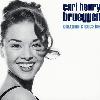 Sometimes it's from the most unlikely of places that emerge thesweetest sounds. Carl Henry Brueggen, guitarist for Chicago-based noiseband Mount Shasta, has self-released two EPs of luscious, cinematicexotica that would make Martin Denny and Ennio Morricone both blush.Each clocking in at an all-too-brief ten minutes or so, these discscapture the authentic spirit of bossa nova in a way that I have rarelyseen amongst modern musicians working in the retro-lounge genre. Whatis most impressive about Brueggen's work here (and furthermore whatdistiguishes him) is his use of real instruments and musicians, thusforsaking the more prevalent sample-based methods. Brueggen himselfhelms the guitar, creating the centerpiece around which bass, congadrums, piano, flute, trumpet, pedal steel guitar and airy female vocalsall circulate.
Sometimes it's from the most unlikely of places that emerge thesweetest sounds. Carl Henry Brueggen, guitarist for Chicago-based noiseband Mount Shasta, has self-released two EPs of luscious, cinematicexotica that would make Martin Denny and Ennio Morricone both blush.Each clocking in at an all-too-brief ten minutes or so, these discscapture the authentic spirit of bossa nova in a way that I have rarelyseen amongst modern musicians working in the retro-lounge genre. Whatis most impressive about Brueggen's work here (and furthermore whatdistiguishes him) is his use of real instruments and musicians, thusforsaking the more prevalent sample-based methods. Brueggen himselfhelms the guitar, creating the centerpiece around which bass, congadrums, piano, flute, trumpet, pedal steel guitar and airy female vocalsall circulate. Cinzano & Cocaine and Idler were recorded in 2001 and 2002, respectively. While C&C is chic and jaunty, as the pert, smiling model on the cover suggests, Idleris appropriately languid and mellow. "Sea-Sprite Hula" conjures imagesof mod mermaids frolicking at an underwater cocktail lounge, while thetropical twang of "Rum Toddy" recalls lounge forefather Arthur Lyman'sHawaiian soundscapes.
Cinzano & Cocaine and Idler were recorded in 2001 and 2002, respectively. While C&C is chic and jaunty, as the pert, smiling model on the cover suggests, Idleris appropriately languid and mellow. "Sea-Sprite Hula" conjures imagesof mod mermaids frolicking at an underwater cocktail lounge, while thetropical twang of "Rum Toddy" recalls lounge forefather Arthur Lyman'sHawaiian soundscapes.
To be perfectly honest, these EPs leave me positively beggingfor more. In a day and age where all too often elements of bossa novaand other Latin styles are thrown together haphazardly, Brueggen hastruly done masters of the genres such as Deodato and Marcos Valleproud.
*These EPs turned up at Brainwashed headquarters rather mysteriously,and Mr. Brueggen provides only a postal address as contact informationon the sleeves. However, should this review prompt you to seek themout, they can be obtained from the fine folks at Dusty Groove in Brueggen's native Chicago.
 David Cross' album Shut Up, You Fucking Baby!was a smoldering volley of incensed, seething rage, recycling thenegative energy that had piled up in our society in the last few yearsinto a colossal release of tension and anger through sensible humor. Onthat disc, Cross took a catalogue of indignities and frustrations andturned them into weapons against themselves, and calming an equallyannoyed audience by showing them they weren't the only ones thinkingabout these things. A year later, a slightly calmer but nonethelessintense Cross is back to not let anyone forget. Cross' track titles,which still have no actual bearing on what he is talking about on aparticular track, take thinly veiled jabs at other comedians like "Arapid series of comical noises," "My immigrant mom talks funny," and"My child is enthralling, especially when it says somethingunexpectedly precocious even though it doesn't understand what it justsaid!" Surprisingly in light of that last title, Cross begins the setwith a rumination on his friend's newborn children and how they borehim with their stories. He takes this topic into deviously dark places,though, and makes it a palatable opener with a few quick bursts ofbrilliantly crass stabs. Throughout his comedy, Cross positions himselfas the underground town crier, pointing out the foibles of mainstreamsociety that seem absurd to all those who pride themselves upon beingliterate, informed, and quite possibly too haughty for their own goodat times. When he is truly on, this side of Cross is a blistering,riotous, sneering champion of common sense. In the space of threeminutes, Cross hits upon consumer catastrophes, what passes fortraditional entertainment, and the banality of mainstream rock music.The examination of the 'electric scissors' treads much of the sameground as his look at the "squagle," or square bagel, on his last albumShut Up, You Fucking Baby!, but lacks the pure, seething vitrioland expert setup that that story had. He quickly segues from that intoa cute mocking of Family Circus, admittedly an easy target, but wellmined by Cross to elicit laughter. From there, he engages an audiencemember in a discussion of Evanescence, Staind, and P.O.D. For a moment,one might imagine cross standing in the corner of a dark club, drinkinghis Pabst Blue Ribbon and holding court with a gaggle of shabbilyattired hipsters, dispensing of these immaterial offenses in rapidsuccession-describing the aforementioned bands as "corporate" and"phony." He's right, of course, though here he edges betweendisseminating important cultural information and preaching to thechoir, finally saving it with another savage slice, claiming that hewould "rather hear the death rattle of my only child," than listen totheir music. Cross is at his peak when frothing at the mouth aboutsomething so obviously apparent that everyone should, but doesn't,realize. Like on his last album, he touches on the Bush administrationsmangling and dumbing down of our global situation by merely stating thefacts in a straightforward and exasperated way that makes it all themore powerful. While there is less shouting in these passages, there isjust as much weight behind Cross' incisive sarcasm and satire. It's Not Funnyis an apt title for this disc, not because Cross doesn't provide plentyof laugh out loud moments, but because the topics he is musing over areof extreme gravity. Thorough his craft, Cross is showing us thefailings that are before everyone's eyes, that are being missed by adazed public. Showing them in an approachable and humorous way, he iswaging his own little war on complacency, and giving everyone a goodtime while doing it.
David Cross' album Shut Up, You Fucking Baby!was a smoldering volley of incensed, seething rage, recycling thenegative energy that had piled up in our society in the last few yearsinto a colossal release of tension and anger through sensible humor. Onthat disc, Cross took a catalogue of indignities and frustrations andturned them into weapons against themselves, and calming an equallyannoyed audience by showing them they weren't the only ones thinkingabout these things. A year later, a slightly calmer but nonethelessintense Cross is back to not let anyone forget. Cross' track titles,which still have no actual bearing on what he is talking about on aparticular track, take thinly veiled jabs at other comedians like "Arapid series of comical noises," "My immigrant mom talks funny," and"My child is enthralling, especially when it says somethingunexpectedly precocious even though it doesn't understand what it justsaid!" Surprisingly in light of that last title, Cross begins the setwith a rumination on his friend's newborn children and how they borehim with their stories. He takes this topic into deviously dark places,though, and makes it a palatable opener with a few quick bursts ofbrilliantly crass stabs. Throughout his comedy, Cross positions himselfas the underground town crier, pointing out the foibles of mainstreamsociety that seem absurd to all those who pride themselves upon beingliterate, informed, and quite possibly too haughty for their own goodat times. When he is truly on, this side of Cross is a blistering,riotous, sneering champion of common sense. In the space of threeminutes, Cross hits upon consumer catastrophes, what passes fortraditional entertainment, and the banality of mainstream rock music.The examination of the 'electric scissors' treads much of the sameground as his look at the "squagle," or square bagel, on his last albumShut Up, You Fucking Baby!, but lacks the pure, seething vitrioland expert setup that that story had. He quickly segues from that intoa cute mocking of Family Circus, admittedly an easy target, but wellmined by Cross to elicit laughter. From there, he engages an audiencemember in a discussion of Evanescence, Staind, and P.O.D. For a moment,one might imagine cross standing in the corner of a dark club, drinkinghis Pabst Blue Ribbon and holding court with a gaggle of shabbilyattired hipsters, dispensing of these immaterial offenses in rapidsuccession-describing the aforementioned bands as "corporate" and"phony." He's right, of course, though here he edges betweendisseminating important cultural information and preaching to thechoir, finally saving it with another savage slice, claiming that hewould "rather hear the death rattle of my only child," than listen totheir music. Cross is at his peak when frothing at the mouth aboutsomething so obviously apparent that everyone should, but doesn't,realize. Like on his last album, he touches on the Bush administrationsmangling and dumbing down of our global situation by merely stating thefacts in a straightforward and exasperated way that makes it all themore powerful. While there is less shouting in these passages, there isjust as much weight behind Cross' incisive sarcasm and satire. It's Not Funnyis an apt title for this disc, not because Cross doesn't provide plentyof laugh out loud moments, but because the topics he is musing over areof extreme gravity. Thorough his craft, Cross is showing us thefailings that are before everyone's eyes, that are being missed by adazed public. Showing them in an approachable and humorous way, he iswaging his own little war on complacency, and giving everyone a goodtime while doing it.  Adem Ilhan, best known for his bass work in Fridge, showcases hisprominent talents as a solo singer, songwriter, instrumentalist,arranger and producer on this four-song EP, recorded in what he refersto as his werehome. The lush instrumentation and warm progressions onthe rootsy ballad "These Are Your Friends" highlights Ilhan's acousticguitar work, tender vocals and emotional lyrics such as "You've thrownyourself/Into the flames 'cause you're covered in cold." In context,they can bring a tear to the eye. The acoustic strumming of "After theStorm" accompanies a delicate vocal melody which provides the narrativeof a father's loss of his son to the sea, nicely filled out with banjoand a hummed chorus. Musically, the eerie "Let It Burn" focuses on thearpeggiated chord progressions of a kalimba, augmented by Ilhem's ebband flow vocals which at times are doubled-up with xylophone. This EPis a very rich and pleasant surprise from what I would have expectedfrom a member of Fridge, knowing the more electronic direction thatbandmate Kieran Hebden has gone as FourTet. With his full-length Homesongsdisc out, a four-piece touring band and a great video (which can befound on the Domino website) it won't come as a surprise to be seeing alot more of Adem this year.
Adem Ilhan, best known for his bass work in Fridge, showcases hisprominent talents as a solo singer, songwriter, instrumentalist,arranger and producer on this four-song EP, recorded in what he refersto as his werehome. The lush instrumentation and warm progressions onthe rootsy ballad "These Are Your Friends" highlights Ilhan's acousticguitar work, tender vocals and emotional lyrics such as "You've thrownyourself/Into the flames 'cause you're covered in cold." In context,they can bring a tear to the eye. The acoustic strumming of "After theStorm" accompanies a delicate vocal melody which provides the narrativeof a father's loss of his son to the sea, nicely filled out with banjoand a hummed chorus. Musically, the eerie "Let It Burn" focuses on thearpeggiated chord progressions of a kalimba, augmented by Ilhem's ebband flow vocals which at times are doubled-up with xylophone. This EPis a very rich and pleasant surprise from what I would have expectedfrom a member of Fridge, knowing the more electronic direction thatbandmate Kieran Hebden has gone as FourTet. With his full-length Homesongsdisc out, a four-piece touring band and a great video (which can befound on the Domino website) it won't come as a surprise to be seeing alot more of Adem this year.samples:
 It has been a few years since this German trio, comprised of brothers Ronald and Robert Lippok and Stefan Schneider, released their Kölner Brett and Pantone EPs, although members have been busy with other notable projects such as Tarwater and Mapstation. For the better part of their latest disc, Hotel Morgen, they appear to have fallen back on their unique compositional style and structures, use of instrumental and electronic-based sounds and space, which has made them one of my favorite groups, but without the type of sit-up-and-take-notice advances I expected after such a hiatus.
It has been a few years since this German trio, comprised of brothers Ronald and Robert Lippok and Stefan Schneider, released their Kölner Brett and Pantone EPs, although members have been busy with other notable projects such as Tarwater and Mapstation. For the better part of their latest disc, Hotel Morgen, they appear to have fallen back on their unique compositional style and structures, use of instrumental and electronic-based sounds and space, which has made them one of my favorite groups, but without the type of sit-up-and-take-notice advances I expected after such a hiatus.
 Listening to German-based Margareth Kammerer is almost as difficult as attempting to read German without some kind of pocket dictionary. Her style is pale and remote, her attitude near the border of nonexistent, and her references obscure. It's to my benefit that B. Fleischmann, Philip Jeck, and Chris Abrahams are all over this record because, as interesting as her poetic deliveries can be, the semi-charming resonance that marks this recording simply wasn't doing it for me by itself.
Listening to German-based Margareth Kammerer is almost as difficult as attempting to read German without some kind of pocket dictionary. Her style is pale and remote, her attitude near the border of nonexistent, and her references obscure. It's to my benefit that B. Fleischmann, Philip Jeck, and Chris Abrahams are all over this record because, as interesting as her poetic deliveries can be, the semi-charming resonance that marks this recording simply wasn't doing it for me by itself.
 A critical theory professor (whose classes I do not miss at all) onceripped me a new one for making light of The Self-Positioning Statement,that warning sign of gutless scholarly writing that lets all of yourreaders know what a horrible sexist oppressor you are before theyexpose themselves to your thoughts. 'Cause, you know, those same wordswould have a -totally- different effect on their readers if they werecoming from a Trobriand Islander. This is my indirect way of 'fessingup to the fact that I paid very little attention to the capital-Aalternative rock scene in the mid-to-late-'90s, and that I won't beable to tell you exactly which Jane's Addiction album God Bless the Electric Freaksounds a lot like; indeed, it's even a way of saying that I've neverheard a Jane's Addiction album, and that the comparison only came to mevia press blurbs on the band's web site. Taken together, all of thismight even say that, if you got sick of bands with fuzzy guitars in themid-to-late-'90s, you might be inclined to give this one a miss. You'dbe passing up on an entertainingly mixed bag of ideas, though:"Sunshine Supercreep" weaves effected sitar highlights through guitarlines that would have been entirely at home on whichever local radiostation was called The Edge in 1996, and tosses in some vocal harmoniesand UFO-addled lyrics to weird things up a bit, only to give way towhat could easily be My Life with the Thrill Kill Kult trying to hackit as a Metallica tribute band on "Apocalypse Rock" four minutes later.There are a couple of clunkers along the way ("Astrophobia" is draggeddown by its stupid space-hippie lyrics, and the dull pair ofinstrumental interludes really just have me reaching for thetrack-forward button about 30 seconds into each one), but the generallyhigh standard of production, combined with a feeling that the peopleinvolved actually took the time to write and refine their musicalideas, elevate God Bless the Electric Freak well beyond thespace-rock silliness that it could otherwise have been. It's notacademically rigorous by any means, but it sounds like the output ofthe people who were actually worth knowing when you were at university,which is a better deal for my seven bucks.
A critical theory professor (whose classes I do not miss at all) onceripped me a new one for making light of The Self-Positioning Statement,that warning sign of gutless scholarly writing that lets all of yourreaders know what a horrible sexist oppressor you are before theyexpose themselves to your thoughts. 'Cause, you know, those same wordswould have a -totally- different effect on their readers if they werecoming from a Trobriand Islander. This is my indirect way of 'fessingup to the fact that I paid very little attention to the capital-Aalternative rock scene in the mid-to-late-'90s, and that I won't beable to tell you exactly which Jane's Addiction album God Bless the Electric Freaksounds a lot like; indeed, it's even a way of saying that I've neverheard a Jane's Addiction album, and that the comparison only came to mevia press blurbs on the band's web site. Taken together, all of thismight even say that, if you got sick of bands with fuzzy guitars in themid-to-late-'90s, you might be inclined to give this one a miss. You'dbe passing up on an entertainingly mixed bag of ideas, though:"Sunshine Supercreep" weaves effected sitar highlights through guitarlines that would have been entirely at home on whichever local radiostation was called The Edge in 1996, and tosses in some vocal harmoniesand UFO-addled lyrics to weird things up a bit, only to give way towhat could easily be My Life with the Thrill Kill Kult trying to hackit as a Metallica tribute band on "Apocalypse Rock" four minutes later.There are a couple of clunkers along the way ("Astrophobia" is draggeddown by its stupid space-hippie lyrics, and the dull pair ofinstrumental interludes really just have me reaching for thetrack-forward button about 30 seconds into each one), but the generallyhigh standard of production, combined with a feeling that the peopleinvolved actually took the time to write and refine their musicalideas, elevate God Bless the Electric Freak well beyond thespace-rock silliness that it could otherwise have been. It's notacademically rigorous by any means, but it sounds like the output ofthe people who were actually worth knowing when you were at university,which is a better deal for my seven bucks. samples:
 The instrumental hip-hop crowd is already sloughing off towardsinsignificance, with recent releases showing little to no innovation onthe original themes. Another can be added to that list with this latestfrom RJD2, whose new sounds definitely come from the same old tricksfor this set. Truth be told, his last full-length did nothing for me,but the remixes on the HorrorEP gave me some hope that he'd pulled himself out from under theshadows of others to create something original; maybe he learned alesson in that if he let things cook a bit more there'd be somethingreal. That hope not only disappeared but was mercilessly crushed on theopening track, where the same stale drum samples are accompanied byfast cut fades and piano plunks. Then a slow fade out that sounds likeit could be the end of the track, which would have been fine by me, asit seemed like an intro at best. Suddenly, though, the track comesright back in at full volume — SURPRISE! — and right back into the samelame line with a few distorted additions, before fading out slow again,only to come right back in in the same fashion. (It's not the beststart.) RJD2 has a genuine talent for pulling out good voices to throwin on his records, it's just what he layers them over that lacks hereand there and sometimes everywhere. "Exotic Talk" uses a vocoder over amore rock sound, but its bombast is forced and synthetic in nature, notactual. The songs here use vastly varied samples, but the compositionis so very much the same that it never succeeds in revealing anythingmore than the last record. Why he bothered to explore new areas interms of genres to sample, but stayed with the same old productiontechniques, is beyond me. Awkward missteps, like the vocal on "MakingDays Longer," don't improve the overall package, but instead bring itdown even further. There are moments where everything is not mired inmediocrity, such as "Someone's Second Kiss," with its soul vocals andkeyboard soliloquy. Next time, though, it would be beneficial if RJD2expanded his whole repertoire instead of some semblance of it, as itmight create the genre-busting album this genre desperately needs. Plus, an open note to Definitive Jux: Please stop sending out promotional copies of releases that contain anti-pirating voice stamps. It makes it impossiblefor any writer to get a good idea of the music when a voice remindsthem that it's a promo every thirty seconds. At least send out cleancopies to press sources or street teams. I wouldn't have reviewed therecord if I hadn't bought it myself, as it's that detrimental to thelistening experience. Just a thought. I'd never heard anything like itbefore I received this CD.
The instrumental hip-hop crowd is already sloughing off towardsinsignificance, with recent releases showing little to no innovation onthe original themes. Another can be added to that list with this latestfrom RJD2, whose new sounds definitely come from the same old tricksfor this set. Truth be told, his last full-length did nothing for me,but the remixes on the HorrorEP gave me some hope that he'd pulled himself out from under theshadows of others to create something original; maybe he learned alesson in that if he let things cook a bit more there'd be somethingreal. That hope not only disappeared but was mercilessly crushed on theopening track, where the same stale drum samples are accompanied byfast cut fades and piano plunks. Then a slow fade out that sounds likeit could be the end of the track, which would have been fine by me, asit seemed like an intro at best. Suddenly, though, the track comesright back in at full volume — SURPRISE! — and right back into the samelame line with a few distorted additions, before fading out slow again,only to come right back in in the same fashion. (It's not the beststart.) RJD2 has a genuine talent for pulling out good voices to throwin on his records, it's just what he layers them over that lacks hereand there and sometimes everywhere. "Exotic Talk" uses a vocoder over amore rock sound, but its bombast is forced and synthetic in nature, notactual. The songs here use vastly varied samples, but the compositionis so very much the same that it never succeeds in revealing anythingmore than the last record. Why he bothered to explore new areas interms of genres to sample, but stayed with the same old productiontechniques, is beyond me. Awkward missteps, like the vocal on "MakingDays Longer," don't improve the overall package, but instead bring itdown even further. There are moments where everything is not mired inmediocrity, such as "Someone's Second Kiss," with its soul vocals andkeyboard soliloquy. Next time, though, it would be beneficial if RJD2expanded his whole repertoire instead of some semblance of it, as itmight create the genre-busting album this genre desperately needs. Plus, an open note to Definitive Jux: Please stop sending out promotional copies of releases that contain anti-pirating voice stamps. It makes it impossiblefor any writer to get a good idea of the music when a voice remindsthem that it's a promo every thirty seconds. At least send out cleancopies to press sources or street teams. I wouldn't have reviewed therecord if I hadn't bought it myself, as it's that detrimental to thelistening experience. Just a thought. I'd never heard anything like itbefore I received this CD. 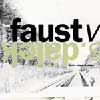 On paper, the pairing of German krautrock godfathers Faust with NewJersey Hip Hop trio Dälek sounds like a soundclash of epic porportionsthat has as much potential to work as it does to fail spectacularly.Through a brief studio collaboration while Dälek were on tour inEurope, the unlikely became a reality and the result is the eight-trackalbum Derbe Respect, Alder.The mutual respect and admiration from both sides is on full displayhere, as Dälek let Faust jam sloppily over pieces of tracks that wouldbe much tighter on a Dälek record proper. Meanwhile, Faust step backand react, allowing Dälek to infuse the tracks with their signaturetake on abrasive hip hop. Dälek (The MC) flows in an open verse styleover cavernous drones and the sounds of giants battling. Looped beatsmake an appearance and then give way to uncompromising live drummingand bass that takes the funk and mechanizes, becoming less of aninvitation to dance and more of a directive. To their credit, all ofthe performers try to make it work and take what could have been aconfluence of meandering noise and shape it into loose, jammy songs.That none of this is scripted or pre-planed is obvious from the start.In fact, the recording often sounds like a straight mix of a livesession even though parts and takes have been reconstructed somewhatafter the fact. Lo-Fi is the aesthetic of choice rendering the soundquality and mix frustrtating at times. Though these are finished albumtracks, some of the songs are so raw that they more closely resembledemos. This is the sound of two sets of performers learning from eachother and making some noise in the process that is both dense andmacabre, but not entirely unexepected given the creators' respectivebackcatalogs. I find myself appreciating the record more than likingit; I understand the journey and the purpose of it all but it's notalways a trip that I want to take. A straight-up Faust or Dälek recordwould probably find heavier rotation in my player, but being aspectator through Derber Respect, Alder certainly has itsrewards. There's a certain amount of faith required for a project likethis to work, and it calls on listeners to meet the record halfway, toaccept the technical shortcomings and take them with the music as areflection of the experience of creation. The final result is a tenuousbridge between drastically different styles and methodologies thatdemonstrates the power of abandoning preconceptions and going where thecloudy haze of inspiration takes you.
On paper, the pairing of German krautrock godfathers Faust with NewJersey Hip Hop trio Dälek sounds like a soundclash of epic porportionsthat has as much potential to work as it does to fail spectacularly.Through a brief studio collaboration while Dälek were on tour inEurope, the unlikely became a reality and the result is the eight-trackalbum Derbe Respect, Alder.The mutual respect and admiration from both sides is on full displayhere, as Dälek let Faust jam sloppily over pieces of tracks that wouldbe much tighter on a Dälek record proper. Meanwhile, Faust step backand react, allowing Dälek to infuse the tracks with their signaturetake on abrasive hip hop. Dälek (The MC) flows in an open verse styleover cavernous drones and the sounds of giants battling. Looped beatsmake an appearance and then give way to uncompromising live drummingand bass that takes the funk and mechanizes, becoming less of aninvitation to dance and more of a directive. To their credit, all ofthe performers try to make it work and take what could have been aconfluence of meandering noise and shape it into loose, jammy songs.That none of this is scripted or pre-planed is obvious from the start.In fact, the recording often sounds like a straight mix of a livesession even though parts and takes have been reconstructed somewhatafter the fact. Lo-Fi is the aesthetic of choice rendering the soundquality and mix frustrtating at times. Though these are finished albumtracks, some of the songs are so raw that they more closely resembledemos. This is the sound of two sets of performers learning from eachother and making some noise in the process that is both dense andmacabre, but not entirely unexepected given the creators' respectivebackcatalogs. I find myself appreciating the record more than likingit; I understand the journey and the purpose of it all but it's notalways a trip that I want to take. A straight-up Faust or Dälek recordwould probably find heavier rotation in my player, but being aspectator through Derber Respect, Alder certainly has itsrewards. There's a certain amount of faith required for a project likethis to work, and it calls on listeners to meet the record halfway, toaccept the technical shortcomings and take them with the music as areflection of the experience of creation. The final result is a tenuousbridge between drastically different styles and methodologies thatdemonstrates the power of abandoning preconceptions and going where thecloudy haze of inspiration takes you. The second in the two labels' collaborative series of collaborative works, Reciprocess 02features duo, solo, and reciprocal remix tracks by Stephen Mathieu'sFull Swing and Douglas Benford's Si-cut.db. The series' goal is easyenough: to explore the "process" of collaboration in a morecomprehensive way by including evidence of the artists alone, together,and at conscious remove from each other. The most interesting thingabout this set-up is the way it questions the assumed ideal of anycollaboration. By anticipating the range of synthesis and clashavailable to any two artists, Reciprocess assures that thedecision of "which combination is better?" becomes both well-informedand harder to make. Sometimes the points of divergence within aparticular union can be the most interesting, as was the case withvolume one, Komet +/vs. Bovine Life. Conversely on 02,Mathieu and Benford transcend even "complimentary" status by focusingtheir contributions into such a sleek, consistent product thatdistinguishing between remix, joint effort, and solo work will no doubtrequire a second look at the liner notes. Those already familiar withFull Swing will find Mathieu's two solo tracks echo much of theclick-less, bass-driven dub Benford has perfected throughout his yearsunder the Si-cut.db name. His simple and immediate melodic approach,something Mathieu's idiosyncratic output has often rejected, becomesthe disc's support, a skeleton filled in by Full Swing's vibrantglitch-ist accompaniment. Mathieu is one artist whose reliance onglitch or microsound method never seems to result in the same tireddeconstructionist route; he can atomize sound with the best of them buthis reformations always reach further than the simple end of exploitingmusic's ephemeral qualities. Being forced to accommodate Benford'ssolid, even danceable structures only further enlivens hiscollaborator's technique, encouraging dense, swooning textures thatwill inevitably recall the work of Christian Fennesz. In fact, Reciprocess 02would not be a bad recommendation for anyone curious about the resultof a collaboration between the Viennese artist and, say, someone fromthe ~scape label. As with anything Mathieu has a hand in, though, it isspecial on its own terms, fusing the distinctly modern elegance anddelicacy of his music with Benford's more extroverted and romanticstyle in ways that reveal each must have had some affection for theother all along.
The second in the two labels' collaborative series of collaborative works, Reciprocess 02features duo, solo, and reciprocal remix tracks by Stephen Mathieu'sFull Swing and Douglas Benford's Si-cut.db. The series' goal is easyenough: to explore the "process" of collaboration in a morecomprehensive way by including evidence of the artists alone, together,and at conscious remove from each other. The most interesting thingabout this set-up is the way it questions the assumed ideal of anycollaboration. By anticipating the range of synthesis and clashavailable to any two artists, Reciprocess assures that thedecision of "which combination is better?" becomes both well-informedand harder to make. Sometimes the points of divergence within aparticular union can be the most interesting, as was the case withvolume one, Komet +/vs. Bovine Life. Conversely on 02,Mathieu and Benford transcend even "complimentary" status by focusingtheir contributions into such a sleek, consistent product thatdistinguishing between remix, joint effort, and solo work will no doubtrequire a second look at the liner notes. Those already familiar withFull Swing will find Mathieu's two solo tracks echo much of theclick-less, bass-driven dub Benford has perfected throughout his yearsunder the Si-cut.db name. His simple and immediate melodic approach,something Mathieu's idiosyncratic output has often rejected, becomesthe disc's support, a skeleton filled in by Full Swing's vibrantglitch-ist accompaniment. Mathieu is one artist whose reliance onglitch or microsound method never seems to result in the same tireddeconstructionist route; he can atomize sound with the best of them buthis reformations always reach further than the simple end of exploitingmusic's ephemeral qualities. Being forced to accommodate Benford'ssolid, even danceable structures only further enlivens hiscollaborator's technique, encouraging dense, swooning textures thatwill inevitably recall the work of Christian Fennesz. In fact, Reciprocess 02would not be a bad recommendation for anyone curious about the resultof a collaboration between the Viennese artist and, say, someone fromthe ~scape label. As with anything Mathieu has a hand in, though, it isspecial on its own terms, fusing the distinctly modern elegance anddelicacy of his music with Benford's more extroverted and romanticstyle in ways that reveal each must have had some affection for theother all along. 


